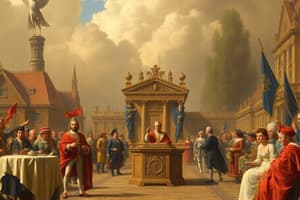Podcast
Questions and Answers
Which of the following best describes the composition of the Third Estate in pre-revolutionary France?
Which of the following best describes the composition of the Third Estate in pre-revolutionary France?
- Exclusively wealthy merchants and landowners.
- Primarily clergy members and religious figures.
- A vast majority of the population, including peasants and commoners. (correct)
- Mainly nobility and members of the royal family.
What was the significance of the Estates General in the context of the French Revolution?
What was the significance of the Estates General in the context of the French Revolution?
- It solidified the king's absolute authority and suppressed dissent.
- It provided a platform for all social classes to discuss grievances and propose reforms. (correct)
- It was solely responsible for the execution of King Louis XVI.
- It primarily focused on matters relating to the Church and religious affairs.
Which action by the National Assembly demonstrated a clear challenge to the established social order of pre-revolutionary France?
Which action by the National Assembly demonstrated a clear challenge to the established social order of pre-revolutionary France?
- Declaring war on neighboring countries to expand French territory.
- Executing King Louis XVI for treason, thereby abolishing the monarchy. (correct)
- Increasing the tax burden on the Third Estate to alleviate national debt.
- Formally requesting the king to address their profound economic grievances.
What was the Taille in pre-revolutionary France, and how did it contribute to the unrest?
What was the Taille in pre-revolutionary France, and how did it contribute to the unrest?
How did the principles of 'liberty, equality, and fraternity,' which emerged from the French Revolution, impact the social structure of France?
How did the principles of 'liberty, equality, and fraternity,' which emerged from the French Revolution, impact the social structure of France?
Which of the following events is most directly associated with the Reign of Terror during the French Revolution?
Which of the following events is most directly associated with the Reign of Terror during the French Revolution?
In what way did the French Revolution influence other parts of the world?
In what way did the French Revolution influence other parts of the world?
Which of the following factors was the LEAST significant cause of the French Revolution?
Which of the following factors was the LEAST significant cause of the French Revolution?
Flashcards
The Three Estates
The Three Estates
The social classes in pre-revolutionary France: clergy, nobility, and commoners.
Taille
Taille
A land tax that burdened the common people in France before the revolution.
Estates General
Estates General
A legislative assembly representing the three estates, convened by King Louis XVI in 1789.
Reign of Terror
Reign of Terror
Signup and view all the flashcards
Execution of King Louis XVI
Execution of King Louis XVI
Signup and view all the flashcards
Social Inequality
Social Inequality
Signup and view all the flashcards
Consequences of the Revolution
Consequences of the Revolution
Signup and view all the flashcards
Liberty, Equality, Fraternity
Liberty, Equality, Fraternity
Signup and view all the flashcards
Study Notes
French Revolution: Causes, Events, and Consequences
- The French Revolution was a period of significant social and political change in France, marked by challenges to the existing order.
- French society was divided into three estates: the clergy (First Estate), the nobility (Second Estate), and the commoners (Third Estate).
- Significant financial burden was placed on the Third Estate, particularly the peasantry, through taxation (like the Taille).
- The Estates General was a representative body, called by King Louis XVI in 1789, with representatives from each estate.
- Causes of the revolution included: poor harvests leading to food shortages and price increases, the desire for social change (Equality), and the privileges enjoyed by the nobility and clergy.
- The execution of King Louis XVI in January 1793 marked a pivotal moment in the revolution.
- He was executed for treason following an attempted escape.
- The reign of terror, a period of violence, ensued under the Jacobins.
- Life before the revolution was characterized by significant disparities between the estates.
- The nobility and clergy had significant privileges, exempt from taxation.
- The commoners faced financial burdens and social inequality.
Revolution's Impact
- The French Revolution led to the abolishment of the monarchy.
- It established new principles—liberty, equality, and fraternity—as central to French identity.
- The revolution reshaped political and social landscapes, inspiring similar movements globally.
- The revolution's impact continues to be studied and remembered.
Studying That Suits You
Use AI to generate personalized quizzes and flashcards to suit your learning preferences.
Related Documents
Description
Explore the French Revolution marked by social and political change. From the burden on the Third Estate to the Reign of Terror, understand the causes, key events, and profound consequences that reshaped France.





